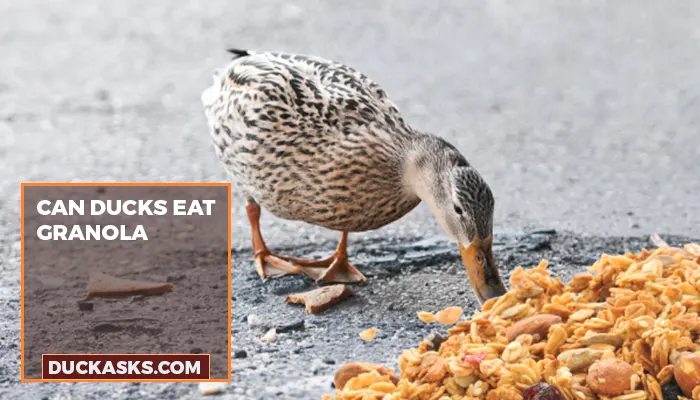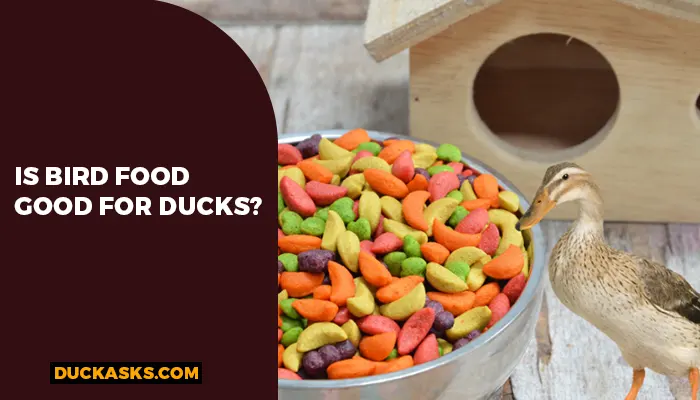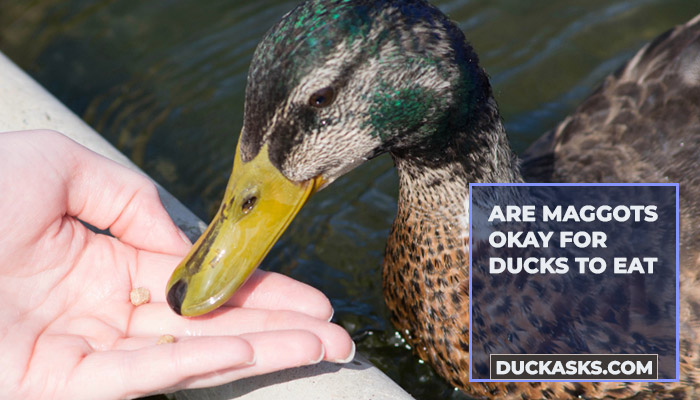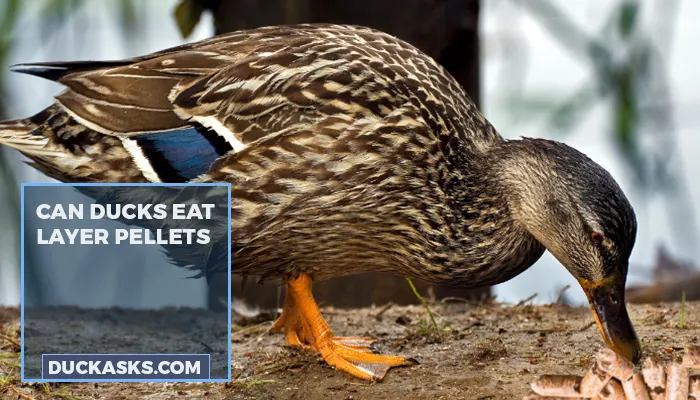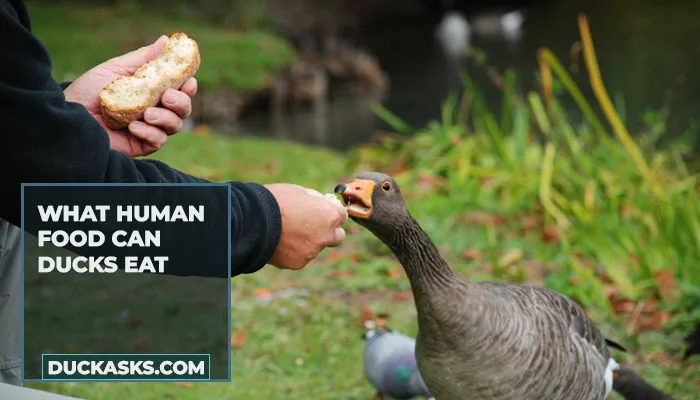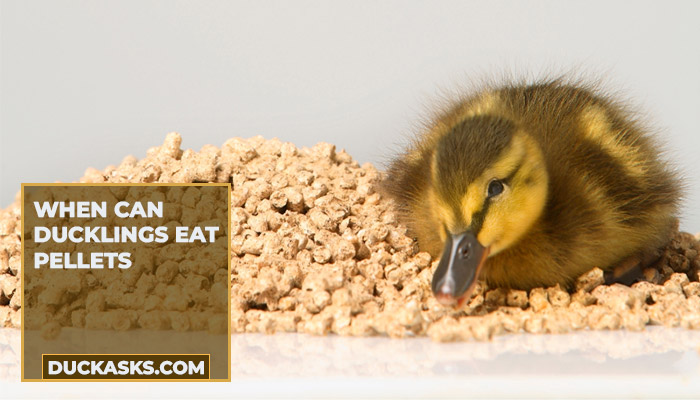Do Ducks Eat Bugs?
Ducks are famous for their affection for water and characteristic quacking, but what about their diet? Do these feathery buddies consume insects like bugs, or do they prefer a vegetarian diet?
Yes! Ducks do consume insects. Wild ones have been observed feeding on various small animals and insects, including water bugs, snails, and aquatic larvae. They also eat plants, seeds, and other tiny prey depending on what is available in their environment.
Let’s take a look at what types of bugs and small insects ducks typically eat, along with the benefits these foods offer to their health. So stick till the end!
Related articles about duck foods:
Why Do Ducks Eat Bugs?
Ducks are omnivorous in nature, eating anything from water-based plants, leafy greens, and grains to bug and worm flesh
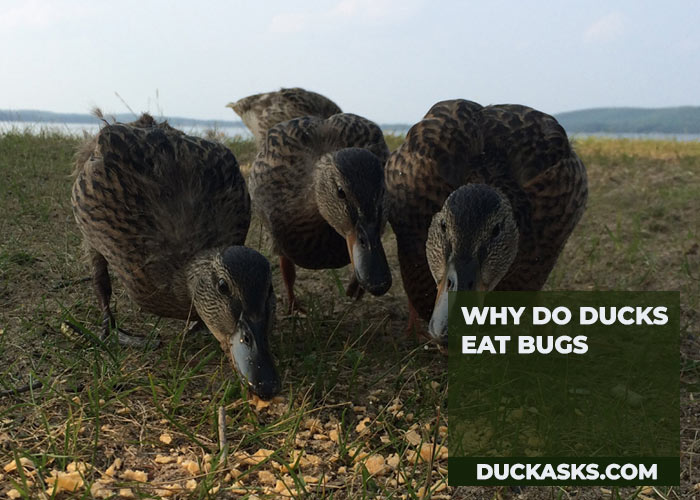
They are not picky about their diet and will eat anything that is offered. If you see a duck eating bugs, it signifies it was looking for food and discovered bugs to be a great source.
You might be surprised to find that they are occasionally utilized for pest management owing to their omnivorous nature. Bugs are essentially tasty treats for ducks.
Do Ducks Eat All Bugs?
As previously said, ducks will likely consume various bugs depending on what is available and palatable. Although there are not picky about diet, some easy-to-catch insects are commonly noticed in their meal plan.
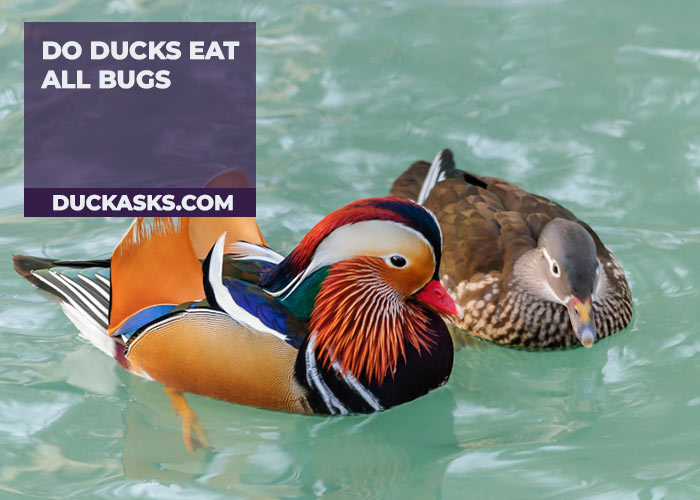
Common Insects Ducks Eat
Some common insects that ducks might eat include beetles, grasshoppers, flies, and worms. These insects typically contain high protein and other essential nutrients that make them a valuable part of a duck’s meal.
Aside from the sorts of bugs, the specific insects they ingest may vary based on their location and the availability of different species in that area. Moreover, their eating selection sometimes depends on the habitat they live.
Eating Preference Based on Habitat
Ducks in grassland habitats, for example, may have access to a different variety of insects than ducks in marsh habitats.
It’s worth noting that ducks may not eat every type of bug and may have preferences for certain kinds of insects.
For example, a duck may be more inclined to eat beetles and grasshoppers rather than flies or worms. This preference may be due to the taste or nutritional value of the different types of insects.
Ultimately, the sorts of bugs that ducks eat greatly vary and may be influenced by various factors, such as the diversity of the insects, the nutritional value of the bugs, and the tastes of the particular duck.
How Do Ducks Eat Bugs?
Despite how a duck’s bill is structured, contrary to popular belief, ducks do not actually chew their food. They have very small teeth, which are less than ideal for breaking down food.
When eating insects, ducks use their beaks to pluck the bugs from the water or from plants and other surfaces. Once the insect is in their beak, the duck will typically crush it with its bill before swallowing it.
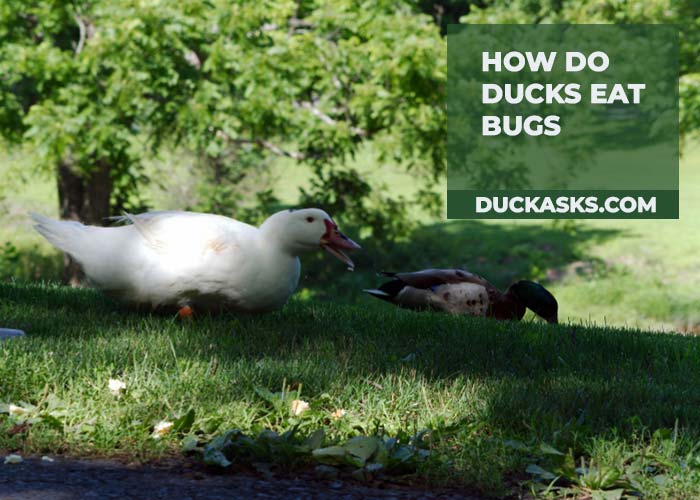
Ducks have a muscular gizzard in their stomach that helps to grind up and break down their food, including insects. The gizzard works in combination with the duck’s beak and tongue to chew and process its food.
They do not try to chew their food deliberately simply because it is not effective enough. However, ducks do have salivary glands that produce enough saliva to break down the food which they swallow whole.
As such, ducks use the same technique to eat basically anything. Starting from their usual grains to their bug snacks.
Are Bugs Nutritious?
Bugs can be extremely nutritious. They serve as an adequate source of protein, fats, calcium, iron, and carbohydrates. All of which are required for ducks to grow strong and healthy. It is also advisable for the duck owners to serve insects to the baby ducks.
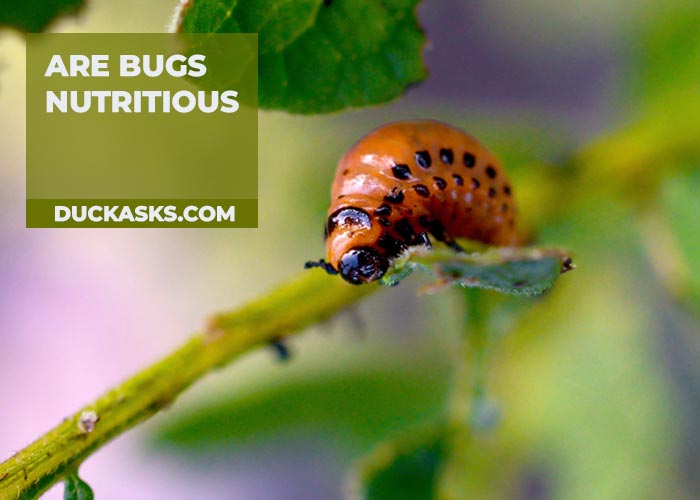
Certain insects and beetles have significant protein, calcium, and iron levels, which are required for bone production and mass growth. The same nutrients assist in thickening eggshells and protect the young before they hatch.
Do Ducks Enjoy Eating Bugs?
Ducks, of course, like to eat bugs; else, they wouldn’t be such great admirers of creepy crawlies. Despite the fact that ducks are unable to feel taste like humans, they do have taste receptors that can detect tastes.
This is because ducks have far fewer taste senses than humans. Ducks have around 400 taste buds, but humans have between 2000 and 4000 taste buds.
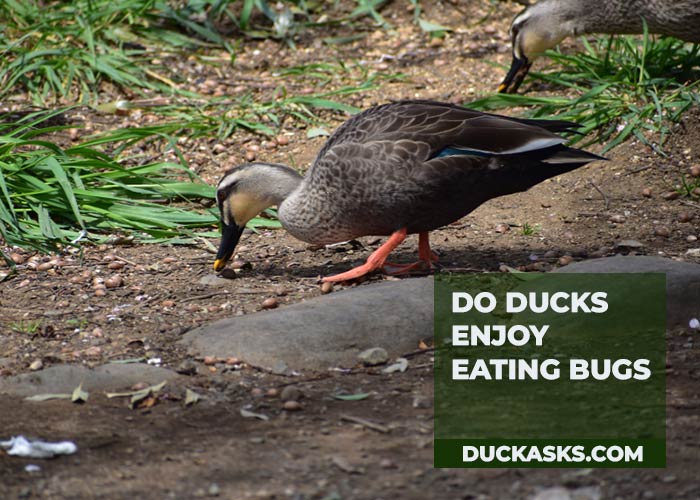
So, they can develop a palette of sorts after they familiarize themselves with eating various bugs. For example, larvae are supposed to taste like beef bone marrow, and grasshoppers are supposed to taste like sardines.
The only metric of comparison we have of these flavor profiles is our own perception of taste and the chemical composition we can observe from these bugs.
Hence, it’s still debatable if ducks actually like insects as much as we think they do.
These are flavor profiles that are much appreciated in the human world. Ducks can relatively taste the same profile but at a much lower intensity.
What Do Ducks Think About Bugs?
It is impossible to tell for definite what ducks believe about bugs since ducks cannot communicate verbally and do not have the same cognitive capacity as humans.
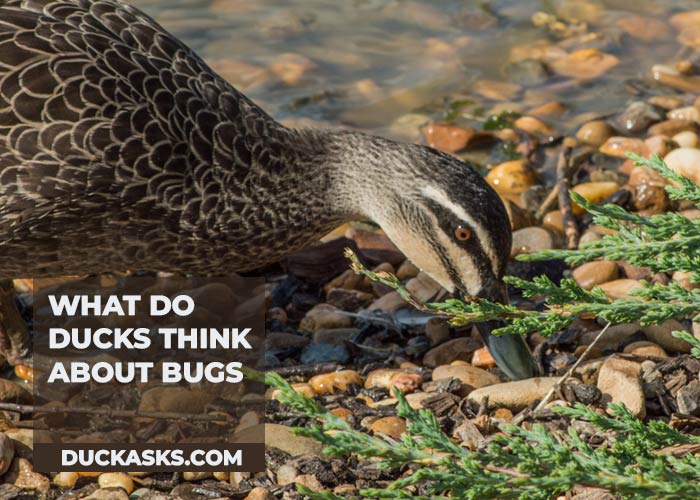
Ducks, on the other hand, are likely to see bugs as a delicious food source in the same way that people regard noodles or fried chicken. Bugs may be a vital element of a duck’s diet since they provide necessary nutrients such as protein, fat, and micronutrients. As a result, ducks are likely to develop a favorable connection with bugs as a flavourful food source.
Do Ducks Eat Bugs in the Water?
Ducks may consume bugs in the water. In reality, several duck species are well-adapted to hunting for insects in watery habitats. Some ducks, like the northern shoveler, have adapted beaks and eating habits that enable them to capture and swallow insects from the water efficiently.
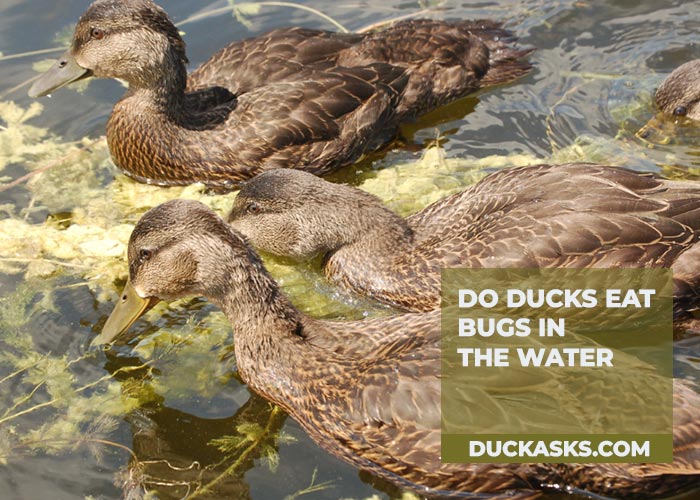
Ducks may devour insects that fall or fly into the water in addition to scavenging for insects in the water. This is especially frequent in regions with dense insect populations, such as near swamps or marshes.
What Happens When Ducks Don’t Eat Bugs?
Bugs serve as a form of snack for ducks. As such, while attaining essential nutrients from them is possible, they are not necessary.
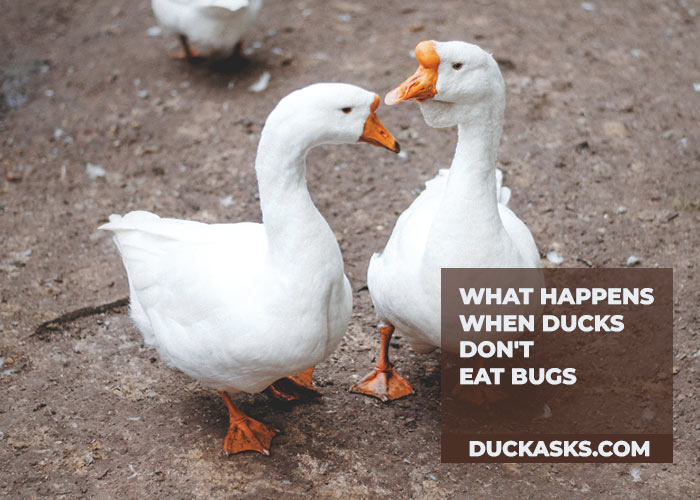
The same nutrients can be gained from other forms of food. So not consuming bugs does not necessarily warrant detrimental effects on ducks.
As such, if there are alternatives, then should ducks consume bugs at all?
Of course! Bugs can add variety to the duck’s meal, which serves as a certain motivator and can even be used as a tool to tame them more easily.
Conclusion
In conclusion, ducks are bug lovers, but it is not a necessity in their diet. They will choose to eat them if they can.
And if not, then they can live fine without them. Anyways, that’s it for this article!
We hope you have found the answers you were looking for. If you did, then support us by sharing our content.
Stay connected with us on Facebook, Twitter, and Pinterest.
Article References
Image Credit: Canva.com/photos

